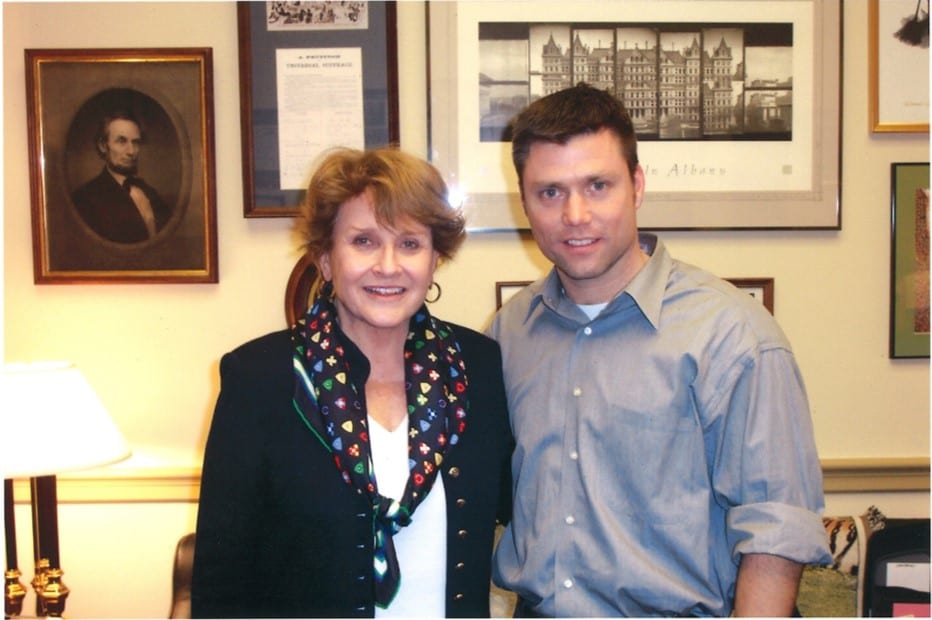Posted By: Jillian Galloway, Science Policy Analyst, ASHG
As the Genetic Information Nondiscrimination Act (GINA) turns ten, ASHG caught up with Daryl Pritchard, former ASHG/NHGRI Genetics and Public Policy Fellow, to discuss his time in Rep. Louise Slaughter’s office working on the passage of GINA and her legacy as the woman who championed genetic information protections in Congress.
ASHG: Trained as a geneticist, how were you able to work in Rep. Slaughter’s office?
Daryl: The opportunity came through the ASHG/NHGRI Genetics & Public Policy fellowship. The fellowship really opened doors for me. It was how I got to see all of the passion Rep. Slaughter had for genetics and science.

ASHG: What was your role in Rep. Slaughter’s office?
Daryl: I was the first fellow and needed to find an assignment on Capitol Hill, and was drawn to Slaughter’s office because of the GINA legislation. GINA was a personal priority for me and something Congresswoman Slaughter was deeply passionate about. I took on the role of Health Legislative Assistant that year. As a geneticist, I could contribute to public understanding of the bill, translating the law’s benefits into layman’s terms. Beyond GINA, I would handle any scientific or health policy issue. GINA was the primary reason I was there, but other important health issues were also on the docket.
ASHG: What was your involvement with GINA while working in Rep. Slaughter’s office?
Daryl: It was pretty intense. The bill had first been introduced in 1995 and I was there in 2003. She needed to gain her colleagues’ support for the legislation and educate other members of staff and the public about its importance. So I drafted talking points for public communications and ‘Dear Colleague’ letters to drum up support from her fellow members of Congress. I would represent Louise at various visits and would promote her vision of protections for the American public against genetic discrimination.
ASHG: Why do you think the passage of GINA was so important to her?
Daryl: She often talked about being the only microbiologist in Congress and being a scientist early in her career. She recognized the importance of scientific research for health and realized that without adequate protections for patients and research subjects, there would be a lingering fear or reluctance on the part of the public to get testing. This, in turn, would stifle the advance of health discovery and the incorporation of genetic information into care.
She had a second motivation as a patient. A clear influence was the death of her sister from pneumonia despite being in doctors’ care. Louise knew genetics was key to improving health, but that if genetic information were used by employers or health insurers, there was a possibility for that information to qualify or disqualify one from coverage or benefits, hiring or firing.
ASHG: What can you tell us about Slaughter’s reaction to the passage of GINA?
Daryl: Louise was really pleased. A lot of hard work, dedication, and time had gone into its passage. To finally get GINA approved as a bicameral and bipartisan piece of legislation reflected her tireless efforts to advance the bill. Referred to as the first civil rights legislation of the new century, it was so necessary for the American public. She believed it was a no-brainer that it should be passed. She congratulated then-President Bush and her colleagues for bringing it to fruition.
ASHG: Ten years after its passage, how can the genetics community help ensure that GINA is implemented as intended?
Daryl: GINA is a great victory for patients and scientists, and you can expect that employers and insurers will continue to challenge it. The genetics community should look at challenges as they arrive and defend the law for its original intent. A key thing to keep in mind is that GINA prohibits even the collection of information by health insurers and employers. Lingering fears about genetic discrimination do not come from a fear of employers’ or insurers’ good intentions, but rather from a concern that genetic data could be exploited or misused. The genetics community should continue to oppose collection of genetic information by employers and health insurers.
ASHG: How is the passage of GINA an example of the impact that the ASHG/NHGRI fellowship has on advocacy?
Daryl: The fellowship promotes the advancement of research and the importance of genetics and genomics. Its impact is far-reaching, and GINA is just one example. Many bills before Congress have a need for genetics and genomics expertise. It is essential that the science is accurately represented in those conversations.
The ASHG/NHGRI fellowship brings the voice of genetics and genomics to legislation and needs to continue to do that by having a presence in different congressional offices. We need to be there. I appreciate the opportunity to have been the first fellow. The experience has been influential in advancing my career.
Daryl Pritchard, PhD, is Senior Vice President of Science Policy at the Personalized Medicine Coalition. He worked in Rep. Slaughter’s office in 2003 through the ASHG/NHGRI Genetics & Public Policy Fellowship.
